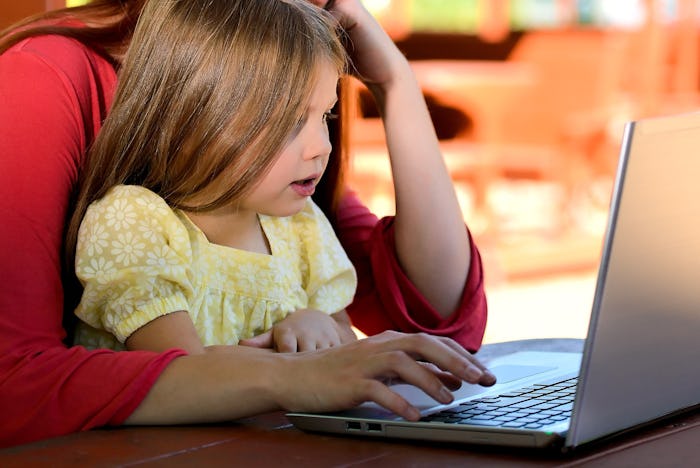If you're anything like I am, sometimes it can feel like there aren't enough ways to keep your children safe. As a mom who's not quite Generation X or a Millennial, I grew up without the internet and social media. My son, on the other hand, knows how to use my smart phone better than I do. That's just one of the reasons I am concerned about his online safety. If you share similar worries, you're not alone. You might be interested in knowing how to check if your kid's photos have been stolen. Thankfully, there are plenty of resources even for the most inexperienced web surfer.
"There are some things parents can do in order to find out if their child's photos have been stolen," Best Company's digital marketing strategist Alayna Pehrson tells Romper. "Perform a Google search with their photo to see what comes up and set up Google Alert notifications so they can be aware if their child's name appears in search engines." Personally, I found that you can both click and drag an image into the search bar or select the camera icon on the Google Image search page and upload a photo directly. Founder and managing director of Security Consulting Alliance Jack Plaxe tells Romper that, in addition to Google, you can also use TinEye or ImageRaider to search for your child's image.
But what can you do to prevent pictures being stolen in the first place? "To avoid such theft, watermark the image with the child's name somewhere it can't be easily removed," chief system engineer at CyberAcme Systems, Inc., Margaret Gel tells Romper. "This makes it difficult for anyone to steal the image and use it anywhere else." If it can't be cropped out, then it's harder for thieves to steal it. If you're sharing photos online, you can take steps to keep things more secure. "When posting to Facebook, make sure to make your images 'private,'" DatabaseUSA's digital marketing manager Janel Scott tells Romper. "Ask friends and family to post images of your child with these same privacy settings." It may be an awkward conversation to have, but it's worth it.
If you tend to keep your computer files backed up, be mindful. "Choose your backup services carefully and read the Terms of Service," member of the Association of Personal Photo Organizers (APPO) Darla DeMorrow says. "If your provider doesn’t say it’s a private service and your photos will never be shared, you can assume that they might be." You can use an external hard drive instead. It's also a good idea to keep your computer up to date with protection against hackers and viruses.
In the unfortunate scenario that you discover your child's photo has been stolen, take action. "If the stolen image is on Facebook, you can report it to Facebook's Unauthorized Use of Photos of Minors form," social media safety advocate for Mazu, Janice Taylor tells Romper. "If a website doesn't take the images down, they you will want to consider legal action." Growing up with a family of lawyers, I'd be remiss if I didn't add that you should also document every step you take in the process. You don't it to be a case of he said, she said. Additionally, you can, "send a Digital Millennium Copyright Act (DMCA) removal request to the webhost that's hosting the image," Gel says. "Hire a company to act on your behalf, take down photos automatically, and avoid giving anyone who has stolen your child's images your address." The world wide web may live up to its vast name, but you still have the right to stand up against any and all cyber threats to your child's safety.
Check out Romper's new video series, Romper's Doula Diaries:
Watch full episodes of Romper's Doula Diaries on Facebook Watch.
